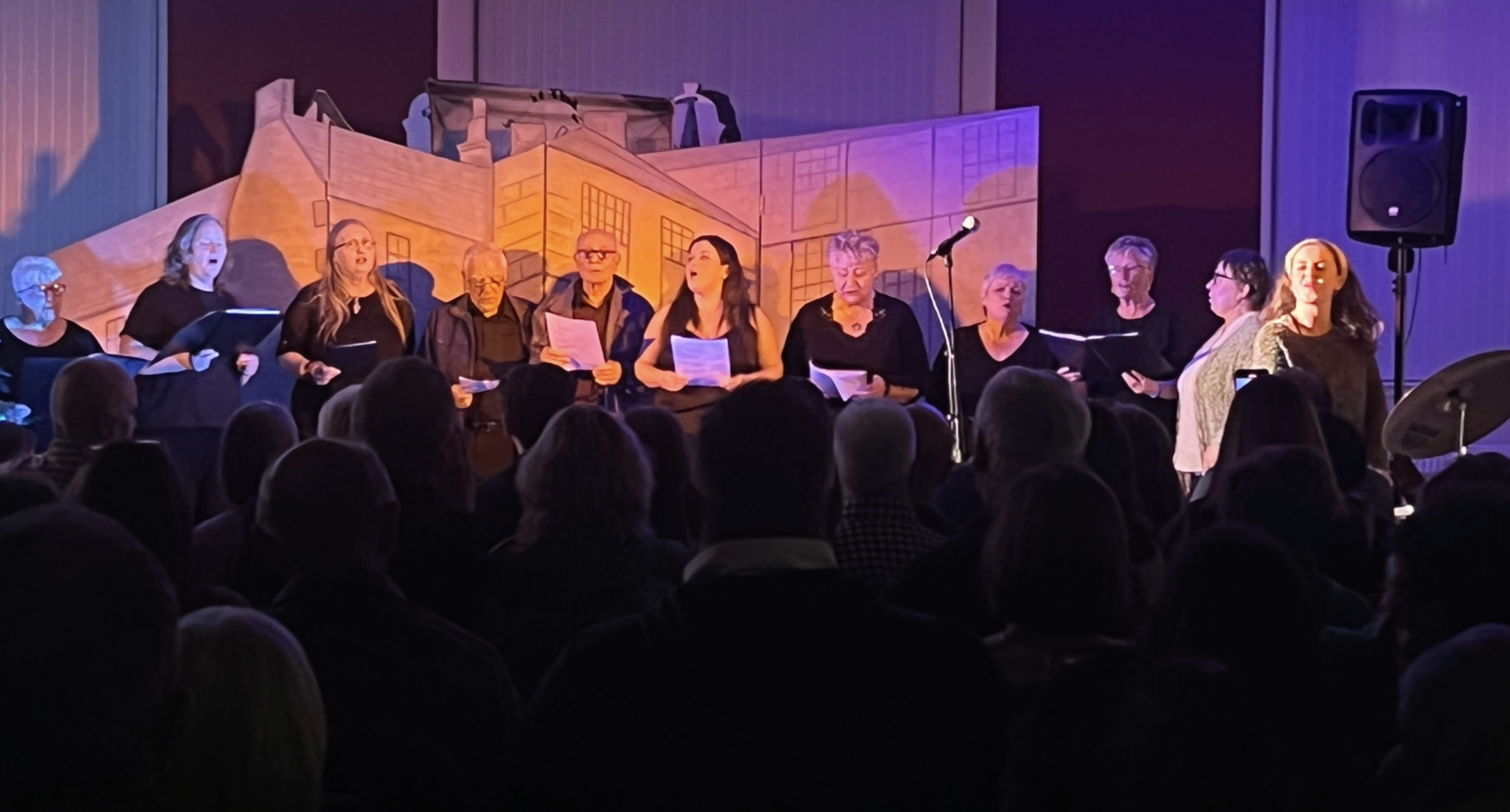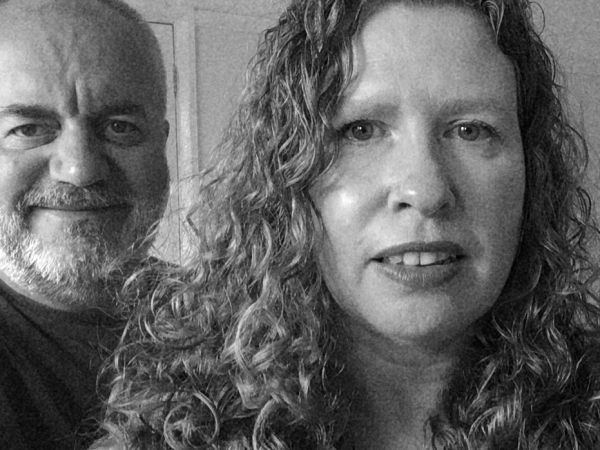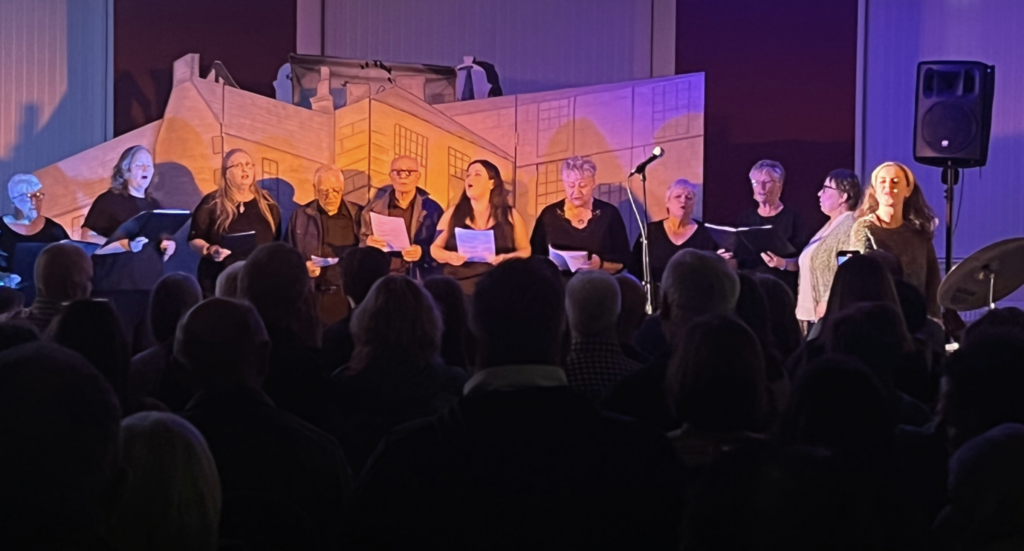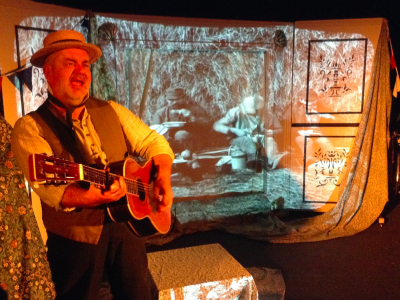
Part 2 MARK STATMAN: MEXICO AND THE POETRY OF GRIEF AND CELEBRATION
Part 2 of my interview with Mark Statman looks closely at Mark’s Latin American poetic influences, his life in Mexico and ends with an extract


I interviewed Neil Gore and Louise Townsend of Townsend Theatre Productions who are “A company making a name for delivering vivid, politically committed theatre” The Observer.
The company “… specifically aim to reach audiences that don’t usually engage with the arts; tour to areas of economic deprivation and social isolation, and perform in community centres, working people’s clubs, village halls, arts centre and theatres in the heart of working-class communities. They take shows into local places that make it easier for older people to engage – residential homes, libraries, day centres and work with their partners to make their shows accessible for people who are deaf or suffered hearing loss (often from working in noisy industries).”
Leslie: Your shows tell stories. How did you research and adapt the stories of Mary Macarthur, Jayaben Desai and Clem Beckett to the kind of performances that appeal to working class/marginalised people and can be put on almost anywhere?
Neil: For each project or individual that is focus of the show, the approach is very different, but the research in each case has to be thorough and clear. Mostly the research relies upon expert comment and analysis in many books and pamphlets, often, but not always, academic, and that can be mixed with library research (newspapers) and interview and oral histories collected from people with first-hand knowledge and personal experience of the subject events or people. So, for instance, in the story of Jayaben Desai and the Grunwick Dispute, we were able to meet many people involved in the strike – either as strikers, trade unionists, politicians, supporters, writers, songwriters, and so on – to get a ‘fuller flavour’ of personal involvement and offer a more informative, non-textbook description, much of which gives the final production a richer immediacy rather than a dull descriptive, academic re-telling. Filmed documentaries and newsreel (even retrospective) are often great resources too, as they capture and reflect thoughts and feelings of the time.
So, working on each production is about winning and earning trust to be able to do justice to an individual’s memory and accuracy to properly celebrate their achievements whilst offering a fully rounded assessment of the struggle they were part of or the events that inspired them to change their life-choices to make a difference.
These people were strong-willed and determined, but they were real people too, with depth to their characters and lives, so we feel it’s important to share that reality. I use the words “trust” and “accuracy” as a reflection of the huge responsibility we at the company feel to get it as right as possible, and to satisfy the expectations of so many people for whom these inspirational “heroes” are so important – our partners such as co-workers and trade unions; social and political campaigners; academics and experts; our audience and venue expectancy, whether they know about them or not.
We nearly always choose to tell these stories chronologically, and offer some measure of ‘background’, to inform audiences of the period (through imagery, poetry and song) or a personal biography up to the main moment of the play.
As much as possible, the company’s style, developed over the course of ten or twelve touring productions, has remained fairly consistent, and that is to use the ‘spoken word’ (for example, in speeches and poetry), projected imagery or newsreel, and songs of the time, as well as contemporary technology (e.g. 1930s gramophone for the Clem Beckett show), to move the narrative forward, give a sense of period and be a source of pure entertainment. All these ingredients are written into the performance to give the show informality, accessibility, fun and appeal for working-class or marginalised audiences that are perhaps not regular theatre-goers, but also harbour enough artistic dexterity to be put on just about anywhere, and to any audience.
Leslie: Can you tell us some representative stories of unusual places you’ve performed and people you’ve reached out to who don’t usually engage with the arts?
Neil: The first was a sold-out performance of ‘The Ragged Trousered Philanthropists’ at the beautiful little Georgian Theatre in the ‘true-blue’ Conservative Party stronghold of Richmond in Yorkshire, and seat of two recent Party leaders, where the audience was made up of people who didn’t realise there were ‘like-minded’ people like them with an opposite to the prevalent political view in the town, but found themselves drawn magnetically to the evening’s performance and to each other. The second was a performance of “We Are the Lions Mr Manager!” about Jayaben Desai at the Shree Kutchi Leva Patel Samaj Centre in Cardiff to an almost exclusively south Asian Gujurati audience of a play about a story of great importance for first and second ‘immigrant’ generation Asian heritage.
The third special performance of “Yes! Yes! U.C.S!” for the 50th anniversary of the Upper Clyde Shipbuilders’ ‘Work-In’ at a community venue near the site of the once great John Brown’s shipyard in Clydebank. The performance was part of special and emotional day of events and talks to celebrate the anniversary; the huge audience was made up of many people involved in the ‘work-in’ and many of the trade union organisers that led the action to save jobs in the early 1970s.
Leslie: As director/producer of the shows, Louise, what have you learned from your days as casting director/stage manager in W. End/national theatres? How does Townsend Productions differ from those projects for you?
Louise: Stage managing in ‘rep’ theatre played a part in helping me understand all aspects and roles in theatre from front of house management to production management to designer to technicians, and so on, and allowed me to develop communication skills to liaise with all departments. So, from that I got a feel for how a large team can run a production and what my role was as stage manager or company manager in that team to run a performance. As regards casting, I worked for some time with a West End casting director, running castings that involved promotion of productions, contact with actors’ agencies, organising casting spaces and inviting auditionees. I also, later, cast shows, films and dancers on my own. This experience was more creative, in that part of the role was to understand and direct actors and guide them through the casting process, especially inbigger auditions for the large productions, such as Lion King and We will Rock You. I also set up casting workshops around the UK to find new actors for the large shows, and this gave me a head start in a more administrative role by helping me to develop skills for producing. For the job of casting director I found you had to be fast-paced, highly-energised and very organised. These traits definitely helped me to come to terms with being a director of my own company.
Managing and producing with Townsend Theatre Productions is quite a different matter; the scale of the company is smaller, with smaller casts, and whereas with a big West End company you are a cog in a big creative collaborative wheel, with my own company I am working with communities on smaller scale; grant funded projects too, which places budgetary constraints on the projects we produce, so there’s a smaller team, and it tends to be more ‘hands-on’ in every aspect. So, in addition to directing and producing, I take on some stage management duties, prop-making, keeping up with the admin and so on.

As regards directing, from my time in West End casting, as I am still drawn to music, singing and dance in the shows, and I work hard to cast and direct shows to make sure the acting is of an exceptional standard.
Leslie: Can you give us examples of how the company has changed/developed Neil’s script and your direction?
Louise: Neil provides me with scripts rich in poetic depth and clear characterisation, but its imperative that an ‘outside eye’ guides the storytelling to coalesce all the elements to work effectively together. It is often the case in new writing of any kind that necessary changes are made in the process of rehearsal to accommodate elements of technology, sound and music, to keep the aim of making the drama as engaging, accessible and fun as possible. The overall style and strategies to achieve that style haven’t changed dramatically, but the improvements in technology, such as better lighting, projection, sound and musical soundtracks, make the process smoother, but slightly more complicated.
An example would be in the production about the Upper Clyde Shipbuilders, was the inclusion of specially created graphic art and animation that was used as backdrops for the songs or as back-drop ‘scene-setters’; all of this added another dimension to the look and feel of the production, along with the extra projection and lighting technology to achieve it.
Leslie: What do you rate as the company’s finest achievement(s) – why those/that one?
Neil: Amongst the company’s finest achievements would have to be our productions of “The Ragged Trousered Philanthropists”, which continues, after nearly fifteen years, to be to requested by venues and audiences. The company first produced a two-handed version of an adaptation of Stephen Lowe’s highly respected adaptation with me and Fine Time Fontayne multi-role playing all the characters, that toured for nearly two years and had a very successful run at Edinburgh Fringe. Later, we re-adapted the book and created a one-person version that I’ve toured just about everywhere! But there’s still a great demand for performances. We were even invited to perform in The House of Commons and the Scottish Parliament as an entertainment, but also to promote discussion amongst politicians that attended.

Louise: “We Are The Lions, Mr Manager!”, about Jayaben Desai and the Grunwick Strike, was given an award for the script and was nominated amongst the Eastern Eye theatre awards, and “We Will Be Free!”, about the Tolpuddle Martyrs, had a Stage Award nomination at the Edinburgh Fringe as well.
Neil: A major achievement for the company was to part of the campaign to overturn the convictions of the Shrewsbury pickets that were ‘stitched up’ by the establishment to be ‘made an example of’, as an attempt to stem trade union activity, during the Building Strike of 1972. The play ‘United We Stand’ was the story of Des Warren and Ricky Tomlinson who, amongst many others, were convicted and jailed for ‘trumped up’ charges of conspiracy during picketing. The play was adopted by the determined Shrewsbury24Campaign as a focus for moves to get the cases in front of the Appeal Court. It played an important role in raising the profile of the case across the media and through large audiences across the UK, and in the eventual success of the campaign and the overturning of the convictions.
Louise: A more personal achievement was for the folk-song ‘opera’ production of the story of the women chain-makers, “Rouse Ye Women”, where we gave folk-singer Rowan Godel an opportunity as a non-actor to take on new and unfamiliar theatrical challenges, which she pulled off with great success; a personal triumph for her in what was one of her last professional engagements before she so sadly left us and passed away three years’ later.
Neil: During Covid we created set up an outdoor theatre space – raised money for a small ‘big-top’ tent and box office/refreshment bar to keep live theatre going during the pandemic. It proved highly successful and toured Dumfries and Galloway and Watford Palace Theatre arts and community festivals, as well as a base for our work in a safe outdoor space.
Louise: It’s quite an achievement to keep the company going at all in this current climate, where subsidies and funding gets tighter, but we have been lucky enough to be able to count on the help of supporters and audiences to raise funds for future projects signalling to other funders that there is a need, desire and future for our work.
ABOUT LESLIE TATE’S BOOKS:

Part 2 of my interview with Mark Statman looks closely at Mark’s Latin American poetic influences, his life in Mexico and ends with an extract

I interviewed international poet and translator Mark Statman about Volverse/Volver, his 14th published collection. Mark, who has won national arts awards, is Emeritus Professor of Literary

I interviewed Lisa Dart, finalist in the Grolier, Aesthetica and Troubadour Poetry Prizes and author of The Linguistics of Light (poems, Salt, 2008), Fathom (prose

I interviewed writer Julia Lee Barclay-Morton about her experience of autism. Julia began as an experimental dramatist in New York, moving to the UK to

I interviewed Gillean McDougall from Glasgow, who edited the collaborative projects Honest Error (on Charles Rennie Mackintosh and his wife Margaret Macdonald) and Writing the
| Cookie | Duration | Description |
|---|---|---|
| cookielawinfo-checkbox-analytics | 11 months | This cookie is set by GDPR Cookie Consent plugin. The cookie is used to store the user consent for the cookies in the category "Analytics". |
| cookielawinfo-checkbox-functional | 11 months | The cookie is set by GDPR cookie consent to record the user consent for the cookies in the category "Functional". |
| cookielawinfo-checkbox-necessary | 11 months | This cookie is set by GDPR Cookie Consent plugin. The cookies is used to store the user consent for the cookies in the category "Necessary". |
| cookielawinfo-checkbox-others | 11 months | This cookie is set by GDPR Cookie Consent plugin. The cookie is used to store the user consent for the cookies in the category "Other. |
| cookielawinfo-checkbox-performance | 11 months | This cookie is set by GDPR Cookie Consent plugin. The cookie is used to store the user consent for the cookies in the category "Performance". |
| viewed_cookie_policy | 11 months | The cookie is set by the GDPR Cookie Consent plugin and is used to store whether or not user has consented to the use of cookies. It does not store any personal data. |